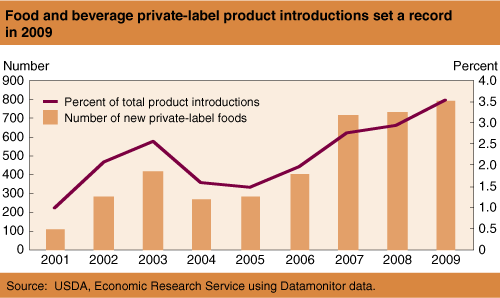Recession Brings Record Number of New Store-Brand Food Offerings
- by Stephen Martinez
- 6/1/2010
In 2009, total U.S. food and beverage product introductions fell for the second consecutive year and only the sixth time since 1993. According to Datamonitor, a leading international supplier of information on new packaged products, 19,047 new food and beverage products were introduced in 2009, down 15.6 percent from 2008. This was the largest annual percent reduction over the past 16 years (see “In the Long Run: Food Product Introductions Buck Long-Term Trend”). The number of private-label (store brand) product introductions, however, set a new record.
Product choices, including larger package sizes, began to multiply in the 1990s as supermarkets and other retailers sought ways to compete with nontraditional foodstores, such as supercenters. Since 2008, however, grocers have seen profits shrink as economic pressures during the recession led budget-conscious shoppers to stay with familiar products and avoid impulse buys. To reduce store operating costs, grocers offered less variety and cut excess inventories. In response, some manufacturers scaled back on product introductions, which include new varieties or package sizes of existing items, as well as new products.
Retailers found that eliminating certain products could boost sales and profits, in part, by making more room for their increasingly popular private-label products. Such brands include Target’s Archer Farms, Costco’s Kirkland Signature, and Publix’s GreenWise Market. In 2009, a record-setting 810 new private-label foods appeared on retail shelves—7 times more than in 2001. Private-label foods ranked fourth among new product claims in 2009, accounting for 3.6 percent of all new product claims—ahead of “high vitamin,” “low or no trans fat,” “quick,” “no preservatives,” and “organic.”
Store brands have been expanding faster than well-known national brands, as retailers have become more adept at creating profitable private-label brands, and recession-strapped consumers have turned to lower priced private-label foods. Industry analysts have found that private-label products are 30 percent cheaper than national brands on average, but that the price discount varies across product categories. Store brands enable retailers to emphasize store identity and increase store loyalty and profits. Store-brand profit margins are, on average, 10 percentage points higher than those on national brands. Furthermore, as product quality has improved, consumers view private-label foods as nearly comparable in quality to national-brand equivalents.
This article is drawn from:
- Processing & Marketing - New Products. (n.d.). U.S. Department of Agriculture, Economic Research Service.


